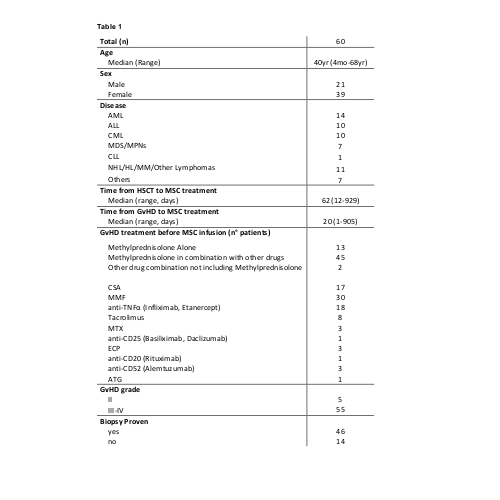
Contributions
Abstract: S817
Type: Oral Presentation
Presentation during EHA22: On Sunday, June 25, 2017 from 08:45 - 09:00
Location: Room N111
Background
Aims
We assessed the impact of MSC treatment on clinical outcomes and investigate factors influencing the response to MSC
Methods
Data collected from a cohort of 60 patients treated with MSC between May 2008 and December 2014 in the UK were analyzed. Clinical grade MSC were generated from bone marrow aspirates collected from the iliac crest of healthy donors and expanded using platelet lysate. All patients received MSC for the treatment of steroid-resistant aGvHD, defined as failure to respond to high-dose steroids (2mg/Kg methyl-prednisolone) after 6 days. Informed consent was obtained from all patients in accordance with the local ethics committee requirements. Clinical responses to MSC were assessed 1 week after MSC infusion. Patients were defined as: a) Responders when an improvement of at least 50% in at least one organ affected by aGvHD was observed, or b) Non-Responders if they had stable or progressive disease.
Results
Patient characteristics are summarized in Table 1. aGvHD was biopsy proven in 45 patients, while in the remaining patients the diagnosis was clinical and based on the exclusion of alternative causes. 10, 16 and 1 patients had skin, gut and liver involvement only, respectively. 16 patients exhibited gut and skin, 11 skin, gut and liver, 3 skin and liver and 3 gut and liver. 34 patients received 1 dose, while 19, 6 and 1 were treated with two, three and four doses, respectively. No side effects were observed. 36 patients (60%) responded to MSC. Amongst patients who received multiples doses (26), subsequent doses did not change the status after the first dose (24 responded, 1 did not respond), except from one patient who, although responding to the first dose, failed to respond to the second one. When we evaluated potential factors for response, organ involvement, age at transplant and the cumulative dose of MSC infused were found statistically significant. Response rate was 67% among patients with involvement of gut, skin or both, but only 22% among those with involvement of the liver (alone or in combination with skin and/or gut). Patients younger than 20 years fared better, with 88% of them responding. Conversely, only 30% and 42% of those aged 20-50 years or older than 50 responded, respectively. Lastly, higher cumulative MSC dose (>3.0x106/Kg) was associated with a response in 76%, while none of those receiving less than 1.5x106/Kg responded. All 3 factors remained significant in multivariate logistic regression analysis. Patient gender, pre-MSC therapy, interval from transplant or aGvHD diagnosis to MSC treatment and grade of aGvHD did not affect response. The impact of achieving a response 1 week after MSC had a profound impact on the overall survival at 18 months accounting for 59% in responders and 17% in non-responders (log-rank test, p<.001).

Conclusion
Session topic: 22. Stem cell transplantation - Clinical
Keyword(s): Mesenchymal stem cell, Clinical outcome, Cellular therapy, Acute graft-versus-host disease
Abstract: S817
Type: Oral Presentation
Presentation during EHA22: On Sunday, June 25, 2017 from 08:45 - 09:00
Location: Room N111
Background
Aims
We assessed the impact of MSC treatment on clinical outcomes and investigate factors influencing the response to MSC
Methods
Data collected from a cohort of 60 patients treated with MSC between May 2008 and December 2014 in the UK were analyzed. Clinical grade MSC were generated from bone marrow aspirates collected from the iliac crest of healthy donors and expanded using platelet lysate. All patients received MSC for the treatment of steroid-resistant aGvHD, defined as failure to respond to high-dose steroids (2mg/Kg methyl-prednisolone) after 6 days. Informed consent was obtained from all patients in accordance with the local ethics committee requirements. Clinical responses to MSC were assessed 1 week after MSC infusion. Patients were defined as: a) Responders when an improvement of at least 50% in at least one organ affected by aGvHD was observed, or b) Non-Responders if they had stable or progressive disease.
Results
Patient characteristics are summarized in Table 1. aGvHD was biopsy proven in 45 patients, while in the remaining patients the diagnosis was clinical and based on the exclusion of alternative causes. 10, 16 and 1 patients had skin, gut and liver involvement only, respectively. 16 patients exhibited gut and skin, 11 skin, gut and liver, 3 skin and liver and 3 gut and liver. 34 patients received 1 dose, while 19, 6 and 1 were treated with two, three and four doses, respectively. No side effects were observed. 36 patients (60%) responded to MSC. Amongst patients who received multiples doses (26), subsequent doses did not change the status after the first dose (24 responded, 1 did not respond), except from one patient who, although responding to the first dose, failed to respond to the second one. When we evaluated potential factors for response, organ involvement, age at transplant and the cumulative dose of MSC infused were found statistically significant. Response rate was 67% among patients with involvement of gut, skin or both, but only 22% among those with involvement of the liver (alone or in combination with skin and/or gut). Patients younger than 20 years fared better, with 88% of them responding. Conversely, only 30% and 42% of those aged 20-50 years or older than 50 responded, respectively. Lastly, higher cumulative MSC dose (>3.0x106/Kg) was associated with a response in 76%, while none of those receiving less than 1.5x106/Kg responded. All 3 factors remained significant in multivariate logistic regression analysis. Patient gender, pre-MSC therapy, interval from transplant or aGvHD diagnosis to MSC treatment and grade of aGvHD did not affect response. The impact of achieving a response 1 week after MSC had a profound impact on the overall survival at 18 months accounting for 59% in responders and 17% in non-responders (log-rank test, p<.001).

Conclusion
Session topic: 22. Stem cell transplantation - Clinical
Keyword(s): Mesenchymal stem cell, Clinical outcome, Cellular therapy, Acute graft-versus-host disease


